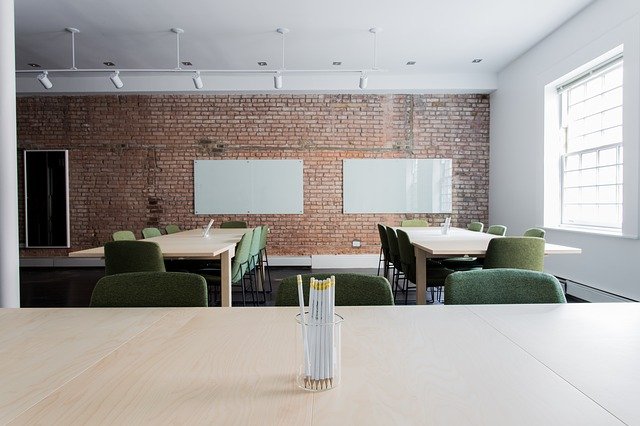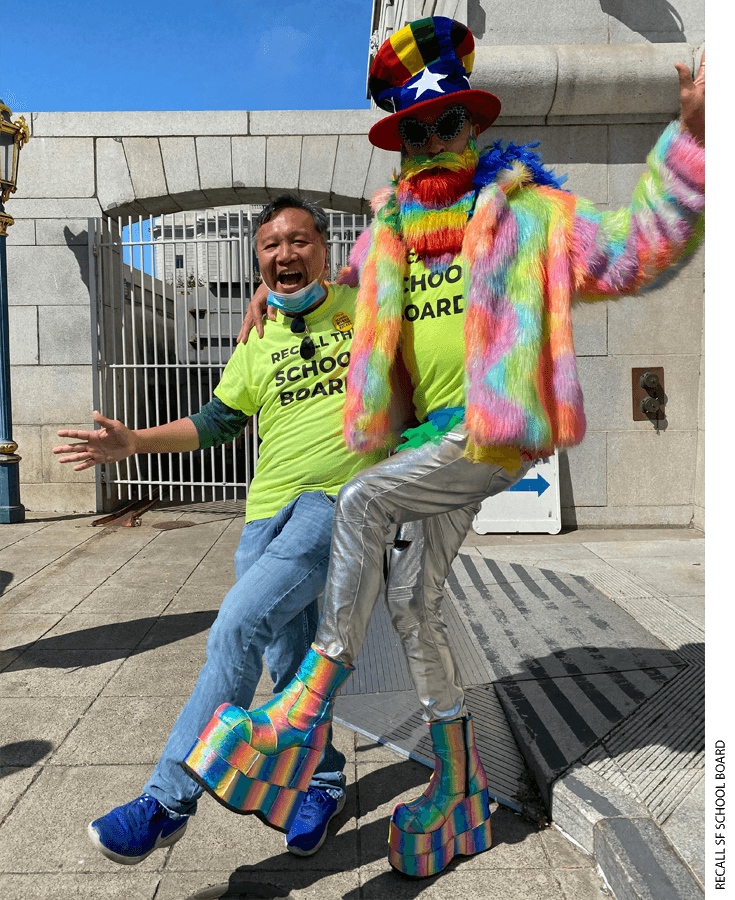
Siva Raj had never attended a school board meeting until his sons began struggling in San Francisco Unified’s remote classes during the Covid pandemic. Reopening was at the bottom of the school district’s agenda, he realized. “It wasn’t a priority.”
He was living with Autumn Looijen, who had three children in suburban Los Altos, one of the first districts to reopen schools. Her kids were healthy, happy, and learning, while his teenager, once an honor student, was depressed, silent, and failing online classes.
In February, Raj, a technology entrepreneur, and Looijen, a software engineer, abandoned their start-up idea and launched a new project on Facebook. With no funding or political experience, they decided to recall three San Francisco school board members. (The other four, recently elected, could not be recalled.)
It worked. They mobilized volunteers to gather tens of thousands of signatures to trigger a recall election. In a February 15 special election, voters will decide whether to remove board president Gabriela López, vice president Faauuga Moliga, and commissioner Alison Collins. It’s likely the same ballot will also decide the fate of District Attorney Chesa Boudin; a separate recall campaign aimed at him has turned in many more signatures than needed.
Looijen is an independent who votes for Democrats. An immigrant from India, Raj is not a U.S. citizen, though under an initiative passed by San Francisco voters in 2016, non-citizens can vote in school elections in San Francisco.
Their priority is education, they say. The school board members “talk about equity,” says Looijen. “The best way to get equity is to get kids in school so they can learn.”
The Facebook launch drew quick results: 8,500 people signed up in the first two weeks.
Sixty percent of voters – 69 percent of those with school-age children – supported the recall in a February poll by EMC Research, and the board has managed to alienate a lot of San Franciscans since then.
Enrollment in the district is 37 percent Asian/Filipino, 28 percent Hispanic, 15 percent white, 7 percent multi-racial and 6 percent black, according to the district. Asian and white students in the district’s public schools do much better than Hispanic students and black students, state and federal standardized tests indicate.
For Asian immigrant parents, “the only way to achieve the American dream is education,” says Raj. “What upsets them is the feeling they’re being shut out.”
The Chinese-American Democratic Club offered 100 volunteers to gather signatures for recall petitions.
Black parents, “hit hard when schools closed,” also signed on, says Looijen.
Teachers also joined. “The vast majority want to do their job well and they don’t see the school board as caring about that,” says Raj.
The school board angered the Alice B. Toklas LGBT Democratic Club by rejecting a gay father for the all-female, all-straight parent advisory council because he’s white.
A San Francisco Chronicle columnist, Heather Knight, talked to one recall campaigner, the father of a 10-year-old. The volunteer was wearing a rainbow beard, top hat, silver pants and platform boots, partly in homage to the 16th president. In January the board had voted to remove the Great Emancipator’s name from a school on the grounds of “colonialism” toward Native Americans. “I’m Gaybraham Lincoln,” he said. “Queens for the recall!”

Monty Worth, a history teacher at Lowell High, also was gathering signatures. “It’s damaging to progressivism to have this kind of radicalism” on the board, he told Knight. “We need practical people, and frankly, much more boring meetings.”
When small donations weren’t enough, venture capitalists Arthur Rock, David Sacks, and Garry Tan became major donors.
In a May poll, also by EMC Research, 71 percent gave the board a negative rating with only 10 percent positive, a huge shift from a poll that asked the same question five years earlier.
Mayor London Breed, who would choose replacements for the three commissioners if they’re recalled, has been very critical of the board’s lack of focus on reopening schools.
In the first pandemic summer, Breed mobilized city staff to open hubs where high-need students could study, play, and get meals. The school district refused to offer space in its empty schools. In a report, researchers noted the hubs might have served more children if not for resistance by some school board members, notably Collins, and by the teachers union.
In October 2020, Breed blasted the board for wasting time on the effort to rename schools. “Get our kids back in school,” she wrote in a statement. Thanks to low coronavirus rates, private schools were teaching in person, she pointed out. Yet, district students are “staring at screens day after day instead of learning and growing with their classmates and friends.”
In January, the board voted to move ahead with renaming 44 schools, canceling Abraham Lincoln, Robert Louis Stevenson and others accused of racism, colonialism, and other misdeeds.
The board also ended merit-based admissions to the city’s academic high school, Lowell. (See “Exam School Admissions Come Under Fire Amid Pandemic,” features, spring 2021) Selectivity “perpetuates the culture of white supremacy and racial abuse towards Black and Latinx students,” stated a resolution. In the future, Lowell will admit students by lottery, regardless of grades or test scores.
A majority of Lowell students are Asian, many from working-class immigrant families who can’t afford private school. “Most people had no chance to speak” about turning Lowell into a comprehensive high school, says Looijen. “Chinese immigrants felt disrespected.”
In March, tweets by Collins surfaced accusing Asians of “white supremacist thinking.” The board removed her as vice president.
Collins filed an $87 million lawsuit against the district and the board members who’d voted against her. A judge dismissed the suit in August.
San Francisco schools are open now, and Raj’s sons are learning again. But the neediest students are way behind, he says, and the board doesn’t seem to think that’s a priority. Raj, Looijen and their Facebook friends believe they’ll succeed in February and ensure that parents’ voices will be heard in the future.
Joanne Jacobs is a freelance education writer and blogger (joannejacobs.com) based in California.
The post Behind a School Board Recall in San Francisco, a Diverse Coalition appeared first on Education Next.
[NDN/ccn/comedia Links]
News…. browse around here

"the board doesn’t seem to think that’s a priority." (haven't done any research on what the board did for kids, prior to, during, or after) Readers should look a bit deeper into what else Sacks and Rock like to also fund. "venture capitalists Arthur Rock, David Sacks, and Garry Tan became major donors."
ReplyDelete